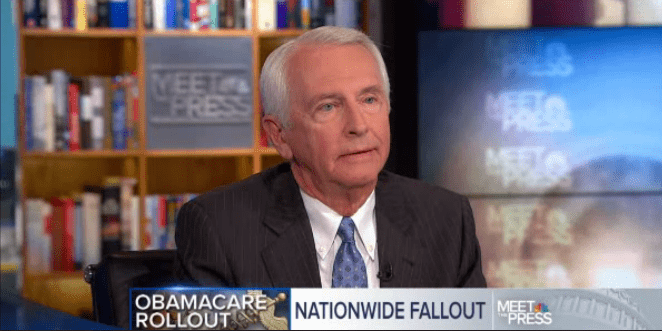(Steven Beshear | Source: NBC)
The biggest Obamacare-related media scandal of the moment is, of course, the fact that some people who buy individual insurance policies have been receiving cancellation letters.
The implication is that when Obama assured people that they could keep their policies if they liked them, he wasn’t telling the truth. The Washington Post‘s factchecker Glenn Kessler awarded this “Four Pinocchios,” which means that Obama’s claim was evidently the worst kind of political lying.
| If cancelled insurance policies are so interesting to the press, it’s worth considering one group that has been significantly less newsworthy. |
There’s no reason to spend time trying to explain Obama’s comment; the law created a system that bolsters private insurance companies, which make decisions all the time about modifying or canceling policies, usually without generating significant headlines. (As someone who knows a little about managing a small business health care plan, I never imagined that receiving a cancellation notice was a big news story.)
So a significant amount of media attention is being directed at the relatively small segment of the population that buys individual insurance. They are certainly being impacted, though the coverage is often less than helpful. As Los Angeles Times reporter Michael Hiltzik (10/30/13) showed, a woman whose cancellation letter has received tremendous attention has other options available to her; she could replace her current policy for less money, or purchase a more comprehensive plan for a little more.
But if these health care anecdotes are so interesting to the press (CNN was apparently going to interview former George W. Bush speechwriter David Frum because he received a cancellation letter), it’s worth considering one group that has been significantly less newsworthy.
Part of the Affordable Care Act expands Medicaid to families that previously made too much money to qualify. As the Kaiser Family Foundation (6/14/12) explained:
A key element of the Affordable Care Act (ACA) is the expansion of Medicaid to nearly all individuals with incomes up to 138 percent of the federal poverty level (FPL) ($15,415 for an individual; $26,344 for a family of three in 2012) in 2014…. By 2016, Medicaid, along with the Children’s Health Insurance Program (CHIP), will cover an additional 17 million individuals, mostly low-income adults, leading to a significant reduction in the number of uninsured people.
This is a tangible benefit that, come January 1, means that many thousands of Americans (except those in states that are refusing the Medicaid expansion) will have coverage they did not have before. As Politico reported (10/29/13), thousands of people are already enrolling.
But how many of them have been profiled on TV newscasts? A quick search of the Nexis database of the three major networks for the month of October turns up nothing. On “Meet the Press” (10/27/13), host David Gregory invited two governors to discuss Obamacare, but waved away a discussion of Medicaid expansion when Kentucky Gov. Steven Beshear brought it up:
BESHEAR: We’ve signed up over 26,000 people so far.
GREGORY: Most Medicaid, though. They’re mostly–
BESHEAR: Well–GREGORY: –getting Medicaid. So it’s not the young and healthy people getting the insurance plans that are really necessary to make this system work, correct?
There was a “CBS Evening News” report (10/2/13) about those who are being denied Medicaid coverage because they happen to live in states where officials have decided not to participate in the expansion. That’s an important part of the story, too; but it is striking that the part of the law that expands coverage for so many poor and near-poor citizens attracts far less attention than anecdotes about those whose individual policies have been cancelled, and who may very well wind up with better policies as a result.
Peter Hart is the activism director at Fairness & Accuracy in Reporting. He writes for the FAIR Blog, where this originally appeared.



0 Comments